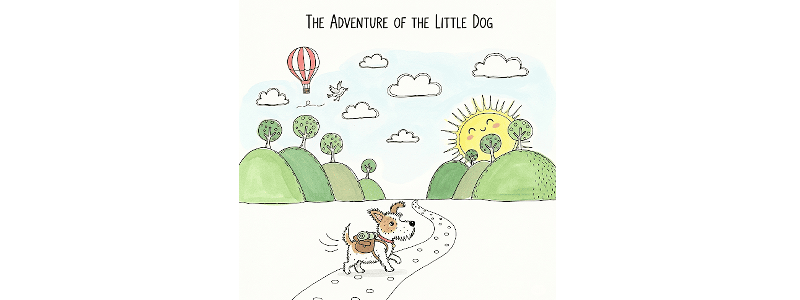HSK3 Reading Practice
Remember to use the menu at the top right of the article to switch between Traditional and Simplified Chinese.
Vocabulary
| 探險探险 adventure, explore | 小朋友喜歡在森林裡探險小朋友喜欢在森林里探险 Children like to go on adventures in the forest. |
| 迷路迷路 get lost | 他迷路了,不知道怎麼回家他迷路了,不知道怎么回家 He got lost and didn’t know how to get home. |
| 緊張紧张 nervous | 她第一次表演很緊張她第一次表演很紧张 She was very nervous for her first performance. |
| 聞闻 smell | 我聞到很香的花我闻到很香的花 I smell a very fragrant flower. |
| 親切亲切 kind, cordial | 老師對學生很親切老师对学生很亲切 The teacher is very kind to the students. |
| 脖子脖子 neck | 他脖子上戴著一條紅色的圍巾他脖子上戴着一条红色的围巾 He has a red scarf around his neck. |
| 牌子牌子 tag, sign | 這個牌子上寫著「不要進去」这个牌子上写着「不要进去」 The sign says “Do not enter.” |
| 主人主人 owner, master | 狗狗看到主人回來高興地跑過去狗狗看到主人回来高兴地跑过去 The dog ran happily to its owner when he came back. |
| 地址地址 address | 請把你的地址寫在這裡请把你的地址写在这里 Please write your address here. |
| 跟著跟着 to follow | 小貓一直跟著媽媽走小猫一直跟着妈妈走 The kitten kept following its mother. |
小狗的冒险
小狗白白很喜欢探险。有一天,他发现一个新的公园,他决定去看看。他在那里玩得很开心,也认识了很多新朋友,但当他准备回家时,他发现自己迷路了。他不知道该走哪条路才能回家觉得非常紧张。白白在公园里走来走去,这边闻一闻,那边也闻一闻,但是还是找不到路。
就在他不知道该怎么办的时候,白白看到了一位老奶奶,老奶奶亲切的叫白白过去。老奶奶摸了摸白白然后看了一下他脖子上挂的牌子。 「小狗狗,你在外面玩得太晚了,主人会担心的。来来,奶奶带你回家去。」说完老奶奶就走向牌子上写的地址,白白跟着奶奶走,很快就回到了家。他非常感谢那位老奶奶,因为她帮助了他找到回家的路。
Questions
Xiǎo gǒu de màoxiǎn
Xiǎo gǒu Báibái hěn xǐhuan tànxiǎn. Yǒu yītiān, tā fāxiàn yíge xīnde gōngyuán, tā juédìng qù kànkàn. Tā zài nàlǐ wán de hěn kāixīn, yě rènshíle hěnduō xīn péngyou, dàn dāng tā zhǔnbèi huíjiā shí, tā fāxiàn zìjǐ mílùle. Tā bù zhīdào gāi zǒu nǎ tiáo lù cáinéng huí jiā juéde fēicháng jǐnzhāng. Báibái zài gōngyuán lǐ zǒu lái zǒu qù, zhè biān wén yì wén, nà biān yě wén yì wén, dànshì háishì zhǎo bú dào lù.
Jiù zài tā bù zhīdào gāi zěnme bàn de shíhou, Báibái kàn dàole yí wèi lǎonǎinai, lǎonǎinai qīnqiè de jiào Báibái guòqù. Lǎonǎinai mōle mō Báibái ránhòu kànle yíxià tā bózi shàng guà de páizi. `Xiǎogǒugǒu, nǐ zài wàimiàn wán de tài wǎnle, zhǔrén huì dānxīn de. Lái lái, nǎinai dài nǐ huí jiā qù.’ Shuō wán lǎonǎinai jiù zǒuxiàng páizi shàng xiě dì dìzhǐ, Báibái gēnzhe nǎinai zǒu, hěn kuài jiù huí dàole jiā. Tā fēicháng gǎnxiè nà wèi lǎonǎinai, yīnwèi tā bāngzhùle tā zhǎodào huí jiā de lù.
The Adventure of the Little Dog
The little white dog, Bai Bai, loved to explore. One day, he discovered a new park and decided to go and have a look. He had a lot of fun playing there and made many new friends, but when he was ready to go home, he found that he was lost. Bai Bai didn’t know which way to go to get back home and felt very nervous. He wandered around the park, sniffing here and there, but he still couldn’t find his way.
Just when he didn’t know what to do, Bai Bai saw an old lady. The old lady kindly called Bai Bai over and patted him before looking at the tag hanging from his neck. “Little doggy, you’re playing outside too late. Your owner will be worried. Come on, let Grandma take you home.” After saying that, the old lady walked toward the address on the tag, and Bai Bai followed her. They soon arrived at Bai Bai‘s home. Bai Bai was very grateful to the old lady because she helped him find the way home.


